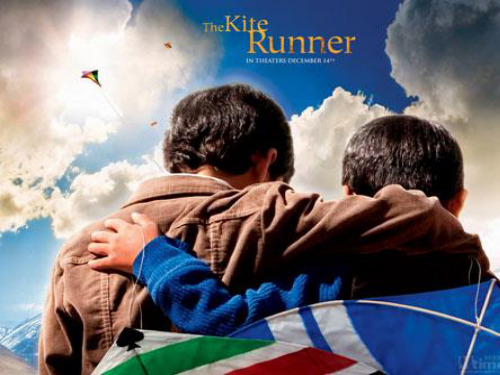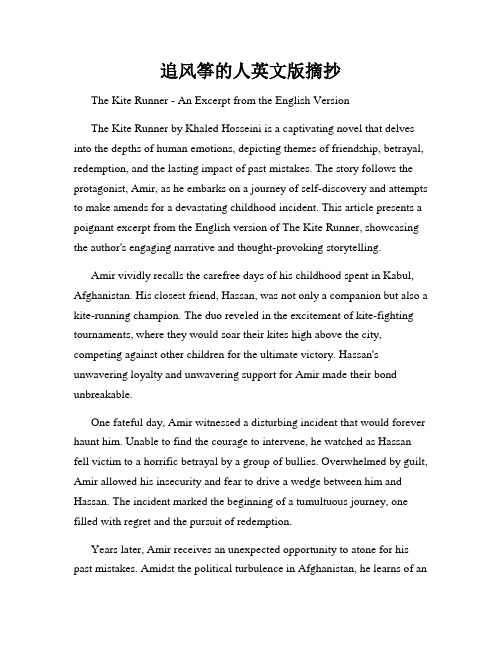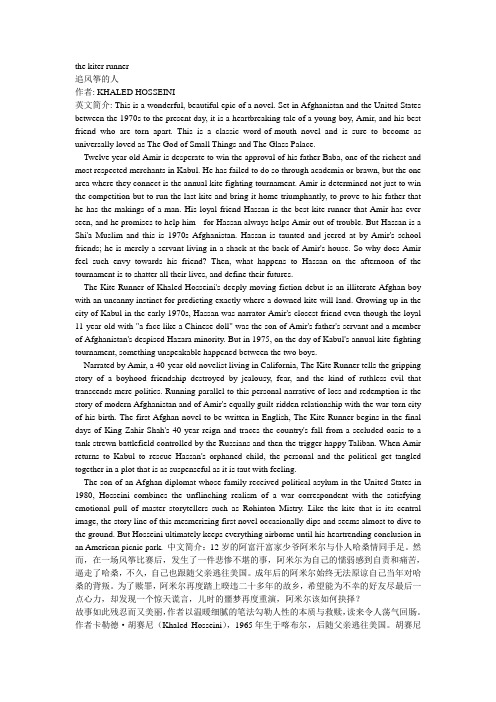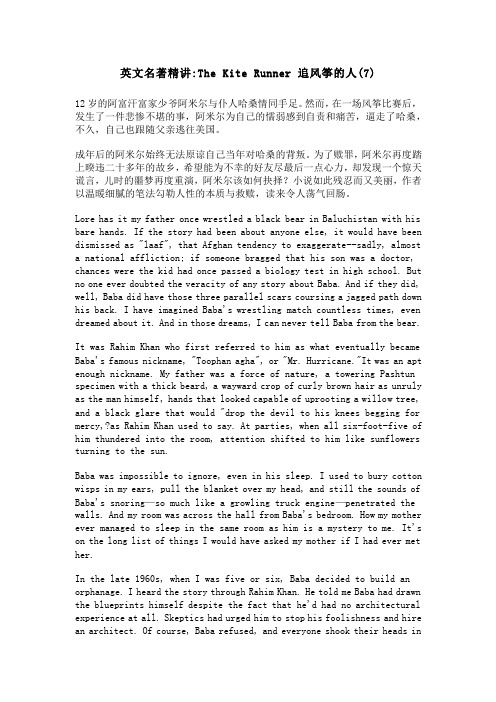The kite runner 英文介绍
追风筝的人英文版

追风筝的人英文版The Kite RunnerIntroduction:The Kite Runner, written by Khaled Hosseini, is an internationally acclaimed novel that tells a captivating story of friendship, betrayal, and redemption. Originally published in 2003, the book has become a modern classic and has been translated into several languages. Set against the backdrop of Afghanistan's tumultuous history, The Kite Runner explores timeless themes and provides a thought-provoking examination of human nature.1. Plot Summary:The Kite Runner follows the life of Amir, a privileged young boy living in Kabul, Afghanistan. The story begins in the 1970s, when Amir and his servant, Hassan, spend their days flying kites and dreaming of victory in a local kite-fighting tournament. However, their lives take a dramatic turn after an unsettling incident that ultimately leads to a rift in their friendship.Amid the backdrop of the Soviet invasion and subsequent rise of the Taliban regime, Amir and his father flee Afghanistan to seek refuge in the United States. Despite their escape, Amir continues to carry the burden of guilt for his past actions. The novel follows his journey of self-discovery and his quest to find redemption, which takes him back to a war-torn Afghanistan.2. Themes:a) Friendship and Betrayal: The Kite Runner delves into the complexities of friendship and explores the consequences of betrayal. Amir's betrayal of Hassan has lasting repercussions on both their lives, highlighting the profound impact of betrayal on relationships.b) Guilt and Redemption: The novel explores the theme of guilt and how it can shape one's life. Amir's guilt over his failure to protect Hassan plagues him, leading him to seek redemption by returning to Afghanistan and facing his past.c) Father-Son Relationships: The story examines the complex dynamics between fathers and sons. Amir's strained relationship with his father, Baba, drives much of his actions, highlighting the desire for paternal approval and the impact of unspoken emotions.d) Socio-Political Climate: Set against the backdrop of Afghanistan's tumultuous history, The Kite Runner provides insights into the adverse effects of war, violence, and political turmoil on individuals and society as a whole.3. Character Analysis:a) Amir – The protagonist of the story, Amir is a complex character driven by guilt and the desire for redemption. Throughout the novel, he experiences significant growth as he confronts his past mistakes and learns valuable lessons about love, loyalty, and forgiveness.b) Hassan – Amir's best friend and servant, Hassan represents loyalty and innocence. Despite enduring hardships, Hassan remains unwavering in his devotion to Amir, ultimately embodying the qualities of a true friend.c) Baba – Amir's father, Baba, is a strong and influential figure in the story. He possesses a strong moral compass and expects the same from others, which puts pressure on Amir and shapes their strained relationship.d) Assef – A key antagonist in the novel, Assef represents the darkness and cruelty that exist in society. He serves as a symbol of the oppressive Taliban regime and poses a significant threat to Amir and Hassan's lives.4. Writing Style and Impact:Khaled Hosseini's writing style in The Kite Runner is compelling and evocative. Through vivid descriptions and emotionally charged narratives, he seamlessly transports readers into the heart of Afghanistan and the tumultuous lives of the characters. The powerful storytelling engages readers on multiple levels, provoking introspection and creating empathy for the characters' experiences.The Kite Runner has had a profound impact on readers globally. By humanizing the experiences of individuals caught in the midst of political upheaval, the novel challenges stereotypes and deepens understanding of the Afghan culture and its people. Its exploration of universal themes such as guilt, redemption, and the complexity of human relationships resonates with readers from diverse backgrounds.Conclusion:The Kite Runner is a poignant and thought-provoking novel that continues to captivate readers around the world. Through its exploration of friendship, betrayal, guilt, and redemption, it offers a deeply moving portrayal of human nature in the midst of adversity. Hosseini's masterful storytelling and rich character development make The Kite Runner a compelling read that leaves a lasting impact on its audience.。
TheKiteRunner精读

TheKiteRunner精读书名:The Kite Runner 《追风筝的人》个人解读:《追风筝的人》是我本人看过的第一本胡塞尼的小说,李继宏的译笔和原文作者文风非常的接近,也成功地为此书赢得了无数的中国读者。
此次阅读原版,一翻开扉页,试读几段,那种初读此书的感动依然存在,这也佐证了,真正的好小说,有着永恒的生命力。
随着阿米尔和哈桑的故事家喻户晓,本书的评论和解读也多如牛毛。
就像译者所说的“在这本感人至深的小说里面,风筝是象征性的,它既可以是亲情、友情、爱情,也可以是正直、善良、诚实。
对阿米尔来说,风筝隐喻他人格中必不可少的部分,只有追到了,他才能成为健全的人,成为他自我期许的阿米尔。
”希望通过这次共读,我们对人性和救赎的故事有更深的体悟。
章节解析:第一章:文章的第一段是一个倒叙,我们知道这个故事会从2001年12月回溯至1975年。
英文小说同样也强调虎头凤尾,第一句话就抓住了读者的注意力。
我们看一下:*I became what I am todayat the age of twelve,on a frigid overcast day in the winterof 1975.Frigid adj. /adv. 很冷的/地 overcast 天气阴的/地李继宏译本:我成为今天的我,是在1975年一些阴云密布的冬日,那年我十二岁。
这句话点明了要讲述主人公少年时代的往事。
* I remember the precise moment,crouching behind a crumbling mud wall, peeking into the alley near the frozen creek.我清楚地记得当时自己趴在一堵坍塌的泥墙后面,窥视着那条小巷,旁边是结冰的小溪。
Crouch 因害怕而蜷伏、畏缩这句话的主干结构是 I remember the precise moment. 我清楚地记得那个时刻。
追风筝的人英文作文

追风筝的人英文作文I remember the first time I read "The Kite Runner". It was like diving into a world I had never known, a world of friendship, betrayal, and redemption. The characters felt so real, their struggles so raw and honest. It was a book that touched me deeply, leaving me with a sense of empathy and understanding that I had never experienced before.The story of Amir and Hassan's friendship haunted mefor days after I finished the book. The way their lives intertwined, the secrets they kept, the sacrifices they made for each other it all felt so achingly human. I found myself thinking about them at odd moments, wondering what choices I would have made if I were in their shoes.But it wasn't just the characters that stayed with me; it was also the setting of the book. The dusty streets of Kabul, the bustling bazaars, the quiet serenity of the pomegranate tree they all became vivid images in my mind, transporting me to a place I had never been but felt like Iknew intimately.And then there was the theme of redemption that ran through the book like a thread, weaving together the characters' lives in unexpected ways. It made me reflect on my own actions, my own mistakes, and wonder if I could ever find the courage to make amends like Amir did.In the end, "The Kite Runner" left me with a sense of hope hope that no matter how broken we may be, no matter how many mistakes we may have made, there is always a chance for redemption, a chance to fly our kites high and free.。
全英文版《追风筝的人》The Kite Runner.ppt

Afghanistan of the early 1970s, the boys are inseparable. They
spend idyllic days running kites and telling stories of mystical
places and powerful warriors
until an unspeakable event
changes the nature of their
relationship forever, and
eventually cements their bond in ways neither boy could have
ever predicted. Even after Amir and his father flee to America,
2007. In 2008, the book was the
bestselling novel in the UK (as of April 11,
2008), with more than
700,000
copies sold.
The Kite Runner , his first novel, was an international bestseller, published in thirty-eight countries, selling in more than 12 million copies worldwide. And it topped amazon list for 131 weeks.
Amir remains haunted by his cowardly actions and disloyalty. In
追风筝的人英文版摘抄

追风筝的人英文版摘抄The Kite Runner - An Excerpt from the English VersionThe Kite Runner by Khaled Hosseini is a captivating novel that delves into the depths of human emotions, depicting themes of friendship, betrayal, redemption, and the lasting impact of past mistakes. The story follows the protagonist, Amir, as he embarks on a journey of self-discovery and attempts to make amends for a devastating childhood incident. This article presents a poignant excerpt from the English version of The Kite Runner, showcasing the author's engaging narrative and thought-provoking storytelling.Amir vividly recalls the carefree days of his childhood spent in Kabul, Afghanistan. His closest friend, Hassan, was not only a companion but also a kite-running champion. The duo reveled in the excitement of kite-fighting tournaments, where they would soar their kites high above the city, competing against other children for the ultimate victory. Hassan's unwavering loyalty and unwavering support for Amir made their bond unbreakable.One fateful day, Amir witnessed a disturbing incident that would forever haunt him. Unable to find the courage to intervene, he watched as Hassan fell victim to a horrific betrayal by a group of bullies. Overwhelmed by guilt, Amir allowed his insecurity and fear to drive a wedge between him and Hassan. The incident marked the beginning of a tumultuous journey, one filled with regret and the pursuit of redemption.Years later, Amir receives an unexpected opportunity to atone for his past mistakes. Amidst the political turbulence in Afghanistan, he learns of anopportunity to rescue Hassan's son from a life of hardship. Despite the dangers that lie ahead, Amir embarks on a treacherous journey back to his war-torn homeland, motivated by the desire to right the wrongs of the past.Through his vivid descriptions and emotionally charged prose, Hosseini paints a vivid portrait of Afghanistan's tumultuous history. As Amir navigates the war-ravaged streets of Kabul, encountering both heart-wrenching destruction and glimmers of hope, readers gain a nuanced understanding of the country's resilience and the profound impact of its brutal past.The Kite Runner not only explores the complexities of friendship and betrayal but also delves into broader themes of cultural identity and the universal human experience. As Amir struggles to find his place in the world, torn between his Afghan heritage and his new life in America, readers are prompted to reflect on their own sense of belonging and the choices they have made.Hosseini's masterful storytelling is further enhanced by his skillful use of symbolism and imagery. The kite serves as a powerful metaphor throughout the novel, representing both the exhilaration of freedom and the persistent presence of guilt. As Amir gazes at the kites dancing in the sky, he is reminded of his past and the profound impact it has had on his life. The kite, once a source of joy and connection, now symbolizes the weight of his regrets and the longing for redemption.In conclusion, The Kite Runner captivates readers with its gripping narrative, moving themes, and thought-provoking exploration of human emotions. Through the journey of Amir, the novel reminds us of theenduring power of friendship, the consequences of our actions, and the possibility of redemption even in the face of our darkest moments. As readers immerse themselves in the world of The Kite Runner, they are transported to a world that is as beautiful as it is heartbreaking, leaving an indelible mark on their hearts and minds.。
the kiter runner

the kiter runner追风筝的人作者: KHALED HOSSEINI英文简介: This is a wonderful, beautiful epic of a novel. Set in Afghanistan and the United States between the 1970s to the present day, it is a heartbreaking tale of a young boy, Amir, and his best friend who are torn apart. This is a classic word-of-mouth novel and is sure to become as universally loved as The God of Small Things and The Glass Palace.Twelve year old Amir is desperate to win the approval of his father Baba, one of the richest and most respected merchants in Kabul. He has failed to do so through academia or brawn, but the one area where they connect is the annual kite fighting tournament. Amir is determined not just to win the competition but to run the last kite and bring it home triumphantly, to prove to his father that he has the makings of a man. His loyal friend Hassan is the best kite runner that Amir has ever seen, and he promises to help him - for Hassan always helps Amir out of trouble. But Hassan is a Shi'a Muslim and this is 1970s Afghanistan. Hassan is taunted and jeered at by Amir's school friends; he is merely a servant living in a shack at the back of Amir's house. So why does Amir feel such envy towards his friend? Then, what happens to Hassan on the afternoon of the tournament is to shatter all their lives, and define their futures.The Kite Runner of Khaled Hosseini's deeply moving fiction debut is an illiterate Afghan boy with an uncanny instinct for predicting exactly where a downed kite will land. Growing up in the city of Kabul in the early 1970s, Hassan was narrator Amir's closest friend even though the loyal 11-year-old with "a face like a Chinese doll" was the son of Amir's father's servant and a member of Afghanistan's despised Hazara minority. But in 1975, on the day of Kabul's annual kite-fighting tournament, something unspeakable happened between the two boys.Narrated by Amir, a 40-year-old novelist living in California, The Kite Runner tells the gripping story of a boyhood friendship destroyed by jealousy, fear, and the kind of ruthless evil that transcends mere politics. Running parallel to this personal narrative of loss and redemption is the story of modern Afghanistan and of Amir's equally guilt-ridden relationship with the war-torn city of his birth. The first Afghan novel to be written in English, The Kite Runner begins in the final days of King Zahir Shah's 40-year reign and traces the country's fall from a secluded oasis to a tank-strewn battlefield controlled by the Russians and then the trigger-happy Taliban. When Amir returns to Kabul to rescue Hassan's orphaned child, the personal and the political get tangled together in a plot that is as suspenseful as it is taut with feeling.The son of an Afghan diplomat whose family received political asylum in the United States in 1980, Hosseini combines the unflinching realism of a war correspondent with the satisfying emotional pull of master storytellers such as Rohinton Mistry. Like the kite that is its central image, the story line of this mesmerizing first novel occasionally dips and seems almost to dive to the ground. But Hosseini ultimately keeps everything airborne until his heartrending conclusion in an American picnic park. 中文简介:12岁的阿富汗富家少爷阿米尔与仆人哈桑情同手足。
追风筝的人英文版The Kite Runner

His eyes searched my face for a long time. We sat there, two boys under a sour cherry tree, suddenly looking, really looking, at each other. That’s when it happened again: Hassan’s face changed. Maybe not _changed_, not really, but suddenly I had the feeling I was looking at two faces, the one I knew, the one that was my first memory, and another, a second face, this one lurking(潜藏) just beneath the surface. I’d seen it happen before--it always shook me up a little.It just appeared, this other face, for a fraction of(一小部分) a moment, long enough to leave me with the unsettling feeling that maybe I’d seen it someplace before.Then Hassan blinked and it was just him again. Just Hassan.
BREAD PPT DESIGN
I dropped next to him, lay on a thin patch of snow, wheezing(喘气). “You’re wasting our time. It was going the other way, didn’t you see?” Hassan popped(取出) a mulberry(桑葚) in his mouth. “It’s coming,” he said. I could hardly breathe and he didn’t even sound tired. “How do you know?” I said. “I know.” “How can you know?” He turned to me. A few sweat beads(汗滴) rolled from his bald(光秃的) scalp(头皮). “Would I ever lie to you, Amir agha?” Suddenly I decided to toy with him a little. “I don’t know. Would you?”
英文名著精讲-The Kite Runner 追风筝的人(7)

英文名著精讲:The Kite Runner 追风筝的人(7)12岁的阿富汗富家少爷阿米尔与仆人哈桑情同手足。
然而,在一场风筝比赛后,发生了一件悲惨不堪的事,阿米尔为自己的懦弱感到自责和痛苦,逼走了哈桑,不久,自己也跟随父亲逃往美国。
成年后的阿米尔始终无法原谅自己当年对哈桑的背叛。
为了赎罪,阿米尔再度踏上暌违二十多年的故乡,希望能为不幸的好友尽最后一点心力,却发现一个惊天谎言,儿时的噩梦再度重演,阿米尔该如何抉择?小说如此残忍而又美丽,作者以温暖细腻的笔法勾勒人性的本质与救赎,读来令人荡气回肠。
Lore has it my father once wrestled a black bear in Baluchistan with his bare hands. If the story had been about anyone else, it would have been dismissed as "laaf", that Afghan tendency to exaggerate--sadly, almost a national affliction; if someone bragged that his son was a doctor, chances were the kid had once passed a biology test in high school. But no one ever doubted the veracity of any story about Baba. And if they did, well, Baba did have those three parallel scars coursing a jagged path down his back. I have imagined Baba's wrestling match countless times, even dreamed about it. And in those dreams, I can never tell Baba from the bear.It was Rahim Khan who first referred to him as what eventually became Baba's famous nickname, "Toophan agha", or "Mr. Hurricane."It was an apt enough nickname. My father was a force of nature, a towering Pashtun specimen with a thick beard, a wayward crop of curly brown hair as unruly as the man himself, hands that looked capable of uprooting a willow tree, and a black glare that would "drop the devil to his knees begging for mercy,?as Rahim Khan used to say. At parties, when all six-foot-five of him thundered into the room, attention shifted to him like sunflowers turning to the sun.Baba was impossible to ignore, even in his sleep. I used to bury cotton wisps in my ears, pull the blanket over my head, and still the sounds of Baba's snoring—so much like a growling truck engine—penetrated the walls. And my room was across the hall from Baba's bedroom. How my mother ever managed to sleep in the same room as him is a mystery to me. It's on the long list of things I would have asked my mother if I had ever met her.In the late 1960s, when I was five or six, Baba decided to build an orphanage. I heard the story through Rahim Khan. He told me Baba had drawn the blueprints himself despite the fact that he'd had no architectural experience at all. Skeptics had urged him to stop his foolishness and hire an architect. Of course, Baba refused, and everyone shook their heads indismay at his obstinate ways. Then Baba succeeded and everyone shook their heads in awe at his triumphant ways. Baba paid for the construction of the two-story orphanage, just off the main strip of Jadeh Maywand south of the Kabul River, with his own money. Rahim Khan told me Baba had personally funded the entire project, paying for the engineers, electricians, plumbers, and laborers, not to mention the city officials whose "mustaches needed oiling."重点精讲:wrestle v. 摔跤He wrestled his opponent to the floor/ground.他把对手摔倒在地上。
- 1、下载文档前请自行甄别文档内容的完整性,平台不提供额外的编辑、内容补充、找答案等附加服务。
- 2、"仅部分预览"的文档,不可在线预览部分如存在完整性等问题,可反馈申请退款(可完整预览的文档不适用该条件!)。
- 3、如文档侵犯您的权益,请联系客服反馈,我们会尽快为您处理(人工客服工作时间:9:00-18:30)。
Part 2 Hassan
✓Hassan: The son of Amir's father's servant . Amir's closest childhood friend. Hassan is actually the illegitimate son of Amir’s father, though Hassan never knows this during his lifetime. Hassan is really loyal to Amir and he would like to do anything for Amir without any reason.
Part 3 Main Content
• Then when the war broke out, Amir and his farther flied to the Unite States. But Amir was never able to forgive himself for betraying Hassan, so he set foot on his hometown after more than 20 years and hoped to make a last effort to save his soul. To his surprise, he found an amazing secret—Hassan was his half brother! After some hard struggles, he rescued Hassan’s son Sohrab from the war. This time, he is not a selfless and timid boy, but a responsible and brave man.
Agha sahib
Amir and Hassan’s father. He is a successful rich businessman, highly respected by local people. When he was in Afghanistan, he often relieved the poor and helped others without pay. However, he did something that he shouldn’t do most---he and his servant’s wife gave birth to Hassan.
Questions
Cherish your friends. Just as the lyrics which describes friendship: If I lost my way ,you’d carry me home, take me all the way to heaven never leave me alone. Friendship never ends.
Amir
✓Amir: The son of a wealthy businessman in Afghanistan. When he was a child, he was selfless, timid and jealous. At his age of 18, he and his father fled to America because of the war in Afghanistan.
Outline
• Author • MaWell-known saying • My thoughts
Part 1 Author
Khaled Hosseini born in Kabul, Afghanistan in 1965 moved to the United States in 1980. American physician and best-seller writer First novel 《The Kite Runner》
Part 5 My thoughts
Everyone has his kite and everyone is a kite runner at the same time. We have to be brave to take the responsibilities that belong to us and admit the errors we have made.
Part 3 Main Content
• Hassan and Amir were closest childhood friends . When Amir was 12 ,a variety of things changed this. There was a game to run the kites ,Hassan tried his best to run the kites for Amir. However, after he got the last kite, three elder boy forced him to give the kite to them. Obviously, it was impossible for loyal Hassan to give it to them. Therefore, they gave Hassan a good biting and insulted him. However, Amir saw this, but he did not save his friend because of his fear. After that Amir felt guilty whenever he saw Hassan. Finally, he chose to force Hassan and Ali to leave.
Part 4 Well-known Saying
• For you, a thousand times over. • Only sin that mattered was theft. When
you tell a lie, you steal a man’s right to the truth. • It’s wrong what they say about the past, I’ve learned, about how you can bury it. Because the past claws its way out. • Time can be a greedy thing--sometimes it steals all the details for itself.
